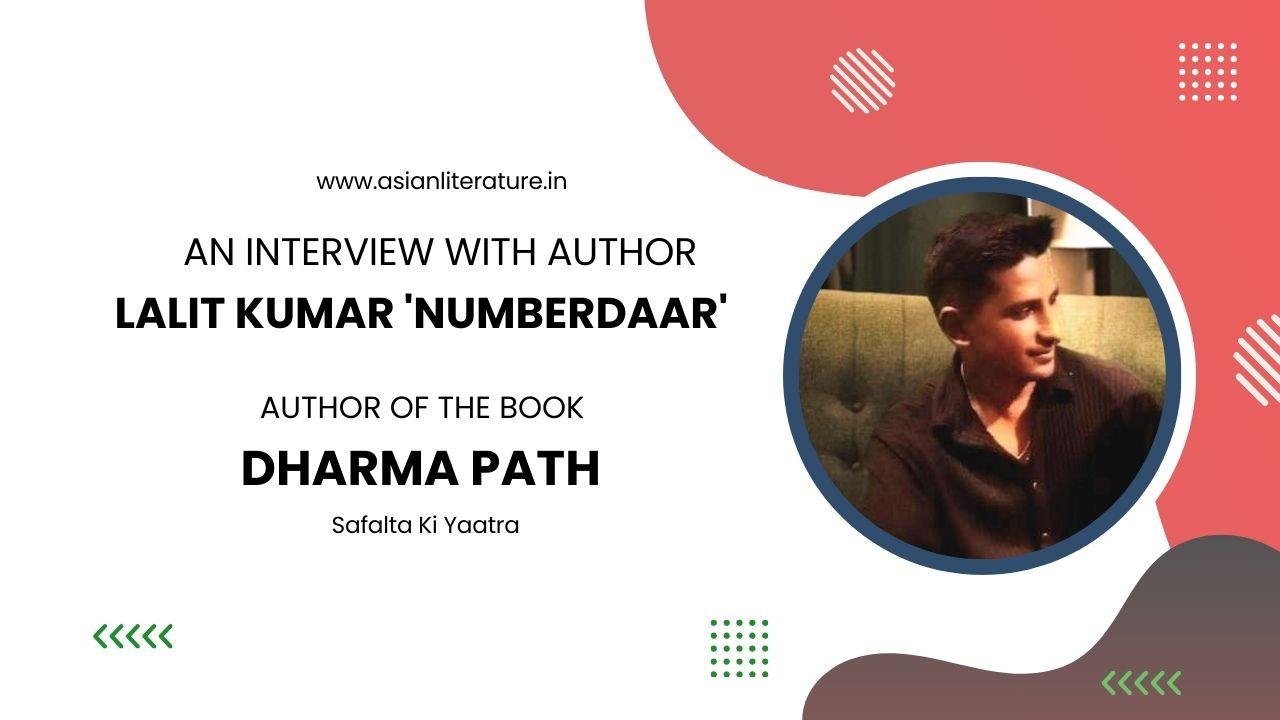
Walk the path of Dharma, walk towards success.
Title: Dharma Path: Safalta Ki Yaatra
Author: Lalit Kumar ‘Numberdaar’
ISBN: 9789363552098
Publisher: Evincepub Publishing
About the author: I am Lalit kumar ‘Nambardar’. I am a fashion designer but a devoted thinker and writer, deeply rooted in the eternal values of Sanatan Dharma. With a heart committed to the spiritual and cultural renaissance of India ,I am trying to brings together philosophy, leadership, and national inspiration in this remarkable work. Through “Dharma Path”, I offers not only a reflection on Narendra Modi’s journey, but also a guiding light for youth and future leaders of Bharat.
Question – Can you tell us in short what your book Dharma Path: Safalta Ki Yatra is about?
Answer – “My book Dharma Path: Safalta Ki Yatra is about how the timeless principles of Sanatan Dharma shape true success and leadership. Taking inspiration from the life of Narendra Modi, it shows how values like patience, truth, forgiveness, and balance can guide not only a leader but every individual towards a purposeful and victorious journey.”
Question – What inspired you to write this book on Dharma and Narendra Modi’s journey?
Answer – “I was inspired to write this book because Dharma, in its true sense, is not just about religion but about values that guide life and leadership. When I observed Narendra Modi’s journey, I saw how patience, truth, discipline, and forgiveness — the ten traits of Dharma — have shaped his path. Through this book, I wanted to connect Sanatan wisdom with a modern leader’s example, so that people can see how Dharma is still the light that leads us to success and balance in today’s world.”
Question – You are a fashion designer by profession. How did you move towards writing on spirituality and leadership?
Answer – “Yes, I am a fashion designer by profession, but creativity has always been a spiritual journey for me. Fashion taught me how every design is born first as a thought, a vision — and that is the essence of manifestation. Over time, I realized that the same principles of vision, patience, discipline, and creativity also apply to life and leadership. My interest in Sanatan Dharma and Narendra Modi’s journey grew from this realization. Writing this book was my way of blending creativity with spirituality, showing how Dharma can guide not only art but also leadership and success in life.”
Question – Why did you choose the ten virtues of Dharma as the main theme of your book?
Answer – “I chose the ten virtues of Dharma because they are universal principles that define a righteous and successful life. They are not limited to religion — they are practical tools for patience, truth, forgiveness, balance, and discipline.
Question – How do you connect Narendra Modi’s life with these values of Dharma?
Answer – When I studied Narendra Modi’s journey, I saw these ten virtues reflected in his leadership and struggles. That’s why I made them the foundation of my book — to show how ancient Dharma can guide modern success.”
Question – Which of the ten Dharma values do you personally feel is most important in today’s time?
Answer – “In today’s time, I feel सत्य (Truth) is the most important Dharma value. We live in an age of noise, misinformation, and constant pressure, but truth builds trust — whether in leadership, relationships, or society. इन्द्रियनिग्रह (Self-control / Discipline) is the key Dharma value today. With so many distractions around us, self-control helps us stay focused, balanced, and true to our goals.”
Question – Many people think Dharma means only religion. How do you explain Dharma in simple words?
Answer – “It’s true that many people think Dharma only means religion, but in reality Dharma is much wider. In simple words, Dharma means the values and duties that keep life balanced and society harmonious. It is truth, patience, forgiveness, discipline, and compassion — the principles that guide us to do the right thing. Religion is one part of Dharma, but Dharma itself is the universal law of righteous living.”
Question – While writing this book, what was the biggest challenge you faced?
Answer – Dharma and leadership are vast subjects, and I wanted the book to feel both spiritual and practical. It was not easy to connect ancient scriptures with modern leadership in a way that every reader — from youth to elders — could understand. But that challenge also became my motivation, because making Dharma simple and relevant was the true purpose of this book.”
Question – Do you think today’s youth can follow these Dharma values in their busy modern life?
Answer – “Yes, I truly believe today’s youth can follow Dharma values, even in a busy modern life. Dharma is not about rituals alone, it’s about choices. Speaking truth, staying disciplined, practicing patience, and showing kindness don’t take extra time — they just need awareness. In fact, these values make life more focused and balanced, which is exactly what the youth need in this fast world.”
Question – In your view, what can young leaders learn from Narendra Modi’s leadership journey?
Answer – “In my view, young leaders can learn three key things from Narendra Modi’s journey — vision, discipline, and resilience. He shows that no matter where you start in life, with patience, truth, and dedication you can rise and serve society. For today’s youth, his example proves that leadership is not about power, but about responsibility and Dharma.”
Question – How do you balance your career as a fashion designer with your passion for writing and philosophy?
Answer – “I started my career as a fashion designer, but over time I felt a deeper calling towards writing and philosophy. Fashion gave me creativity and discipline, but my heart was always drawn to Dharma, spirituality, and leadership. That’s why I decided to dedicate myself fully to writing book and poems — because I believe sharing ideas that inspire society is my true path now.”
Question – Which books or thinkers have inspired your own thoughts about Dharma and leadership?
Answer – “My biggest inspiration has been our ancient scriptures — the Bhagavad Gita and the Ramayana and Thinkers like Swami Vivekananda have also influenced me deeply, as they showed how spiritual values can guide real-world leadership. These sources shaped my belief that Dharma is timeless wisdom, and leaders like Narendra Modi reflect its relevance even today.”
Question – If you had to give one message to the youth of India from your book, what would it be?
Answer – “My one message to the youth of India is: walk on the path of Dharma. Success is not only about position or money, it is about values — truth, patience, discipline, and compassion. If you hold on to these, you will not only achieve your goals but also serve society and make India stronger.
Question – What advice would you like to give to readers who want to bring Dharma values into their own daily life?
Answer – “My advice is to start small. Dharma is not about big speeches, it’s about daily actions. Speak the truth even when it’s hard, practice patience in challenges, forgive instead of holding grudges, and stay disciplined in your goals. If readers bring even one Dharma value into their routine, slowly it becomes a habit, and then a way of life. Dharma lives in our choices, not just in our prayers.”
Question – Do you plan to write more books in the future? If yes, what topics are you thinking about?
Answer – “Yes, I do plan to write more books in the future. Dharma Path: Safalta Ki Yatra is just the beginning. I want to continue exploring how Sanatan Dharma connects with modern life. My next works may focus on topics like manifestation through Dharma and how ancient wisdom can guide personal success in today’s fast-changing world.”

